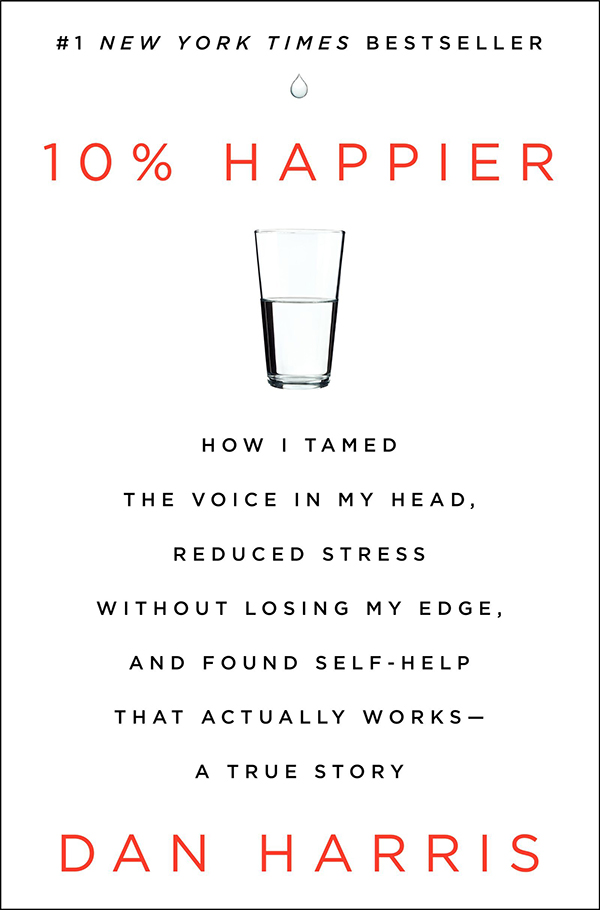After first coming across the Ten Percent Happier podcast just a handful of weeks ago, and subsequently devouring the first 50 episodes with an aggressive appetite for more and more magnificently mindful conversations with some of the most interesting, knowledgeable, and well-practiced people on the planet, I could not wait to receive Dan Harris’ book: “10% Happier: How I Tamed the Voice In My Head, Reduced Stress Without Losing My Edge, and Found Self-Help That Actually Works – A True Story.”
Above all else, the book was a truly enjoyable, satisfying read with excellent pace and a brilliant balance of substance and humor. I highly recommend this book to anyone who is curious about meditation and who enjoys laughing along with others as they poke fun at themselves.
OVERALL REVIEW IN A NUTSHELL
With utterly entertaining fashion, Dan Harris takes us from curious, sincere inquiry to outright belly laughter on his skeptical, sarcastic, and transformational journey into the world of meditation. Including pivotal conversations with industry titans, plenty of amusing and sometimes self-deprecating anecdotes, and deliciously flavorful turns of phrase at every turn, 10% Happier is an enticingly crafted story that invites the skeptical reader to learn from Dan’s quest to discover what lies on the other side of practicing mindfulness and compassion.
THE MOST IMPORTANT LESSON FROM 10% HAPPIER
In my view, this passage from page 207, when Dan is reflecting on his most recent conversation with Dr. Mark Epstein, offers the most valuable takeaway from the entire book:
Striving is fine, as long as it’s tempered by the realization that, in an entropic universe, the final outcome is out of your control. If you don’t waste your energy on variables you cannot influence, you can focus much more effectively on those you can. When you are wisely ambitious, you do everything you can to succeed, but you are not attached to the outcome—so that if you fail, you will be maximally resilient, able to get up, dust yourself off, and get back in the fray. That, to use a loaded term, is enlightened self-interest.
Too often we focus on outcomes. The business world trains us to value them. Success is defined by delivering the outcomes of quarterly shareholder profits, monthly sales quotas, and employee performance reviews. A goal is only good if it’s a S.M.A.R.T. goal, with an “M” for Measurable. We judge our own progress with measuring sticks, benchmarks, and finish lines. We operate from a state of incompleteness, and only if we can get the next promotion, get a three-car garage, or get that next thing our neighbor now has, then we will have made it. Then we’ll be able to slow down. Then we can accept what is, that we have and are enough. We have preconceived ideas of the path we are on, of the way things are “supposed” to go. We have expectations of specific end results of our actions, results that will leave us satisfied with the feeling of achievement.
Yet, if we lean fully into acceptance of the way things are, if we develop apathy toward progress and idle our way through life, if we become cushion-perched gelatinous meditation blobs peacefully content with every single waking moment of every single day, then we can clearly see how life will become difficult for us. We are living, human creatures. We have basic survival needs. At some point I’m going to have to admit that my “desire” for a drink of water or my “feeling” of a hunger pang are actually “survival needs.” And humans have found that collective living is easier and better than independence, so we can share jobs and specialize to survive with less hardship. As our community “improves” and “progresses” from working together (first as tribes and then growth all the way through to modern society), at what point do we agree that we are no longer “progressing,” but instead we are over-striving, over-shooting, over-producing, over-consuming, and spending not enough time simply being and enjoying the abundance of here and now?
How can we reconcile accepting life as it is in this moment and also wanting to make things better for ourselves and for others?
The wisdom in the excerpt above from 10% Happier offers an answer to this contradiction that has plagued me for years. My partner Kristyn has heard me debate with friends ad nauseum about the seemingly unanswerable paradox of these two diametrically opposed traits–acceptance and ambition. It’s the same worldly challenge that New York Times Bestselling Author Gretchen Rubin refers to on the featured image of her homepage: “We can accept ourselves and also expect more from ourselves.” Clearly this notion has been considered by many of us bipedal sapiens.
Do everything you can to succeed. Do not attach to the outcome.
In the book, renowned meditation teacher Joseph Goldstein offered to Dan a useful prompt to use whenever this topic arises in oneself: ask “What matters most?”
If, in any given moment, you are torn between striving for the next thing and sinking into the presence of now, ask yourself, “What matters most?” Your inner voice will reveal the path.
Wise ambition. That’s a goal worth pursuing.
AN APPENDIX THAT’S ACTUALLY USEFUL
Unlike the useless tube at the junction of your large and small intestines, the Appendix in 10% Happier bestows readily digestible utility. In addition to answering a slew of FAQ’s, Harris has conveniently cataloged wonderfully brief meditation instructions in the back of the book. The Appendix covers short steps to getting started with: Mindfulness Meditation, Body Scans, Walking Meditation, Compassion Meditation (aka metta), and Open Awareness Meditation. The instructions are about a half-page each with all meat and no fluff.
HOW TO BUY THE BOOK 10% HAPPIER FROM AN INDEPENDENT BOOK STORE
You can purchase 10% Happier from an independent book store near you by clicking right here.
